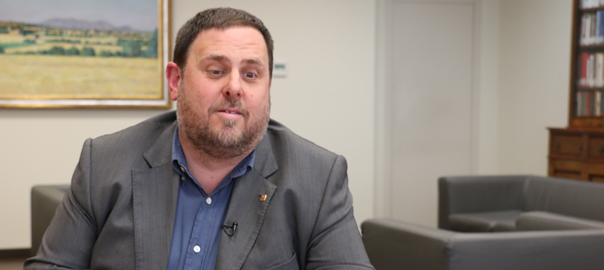02.02.2016 - 16:49
|
Actualització: 01.03.2017 - 12:27
Declarations from the Vice-President of the government of Catalonia and the Minister of Economy and Finance, Oriol Junqueras, to the international press have caused uproar. He talks about the enormous Spanish debt and the inefficiency of the Spanish state, in contrast to the efficiency and reliability that he says that a Catalan Republic would have. Already in the most important period of the whole process, Oriol Junqueras explains in the interview that ‘de facto’ independence will come with the approval of the laws of disconnection, a time when it will not only depend on Catalonia, because the international community will have to take decisions and choose.
—Your declarations to the Financial Times have had a great impact. This thing about warning about the Spanish debt and saying that Catalonia could be a good partner is an important change of strategy…
—The position we have defended in recent days before various international media, the Financial Times and the Global Capital, is not a new position with respect to what we have always said; what is new is that it is done from the responsibility of government.
—But this kind of talk is not usual. Even the journalist of the Financial Times was surprised at your focus…
—Creditors have a custom, which is that they want to recover the money they have lent. In the case of the Spanish state, the fact is that not only do they have a giant debt equivalent to one hundred percent of the GDP, but that the deficit is still growing. It is very important that the citizens of Catalonia, the financial markets and the European institution should know that the problems suffered by the Catalan institutions have not been caused by the economic difficulties of Catalonia, but rather by the arbitrary and unfair decisions of the Spanish government. It is vital that everyone should realise this!
—If this is made clear, what do you think might happen?
—Obviously the position of the international markets and the suprastate institutions such as the European Central Bank will be decisive in the whole of the process we are following. The independence of Catalonia will not depend exclusively on the will of the government of Catalonia. In the context of the Western world, the birth of a new state is never completely unilateral, but has to imply elements of multilateralism, and this will not be strictly public, but there will be players capable of conditioning the attitude of the Spanish government. It is very important to address the financial markets in this sense, for as has been seen in the past, the financial markets have the capacity to condition. And we must remember that this has already been done and that on one summer evening, the PP and the PSOE agreed to change the Spanish constitution.
—Is it a question of convincing the financial markets that they will earn more if Catalonia is independent?
—The financial markets will have to decide whether they have a single spokesperson in the figure of Spain, which up to now has been rather inefficient and not very reliable, or whether they also prefer to have a new spokesperson who has the express and firm will of being efficient and reliable, the Catalan Republic. Our position is that the second option is convenient for everyone. The financial markets will have to accept not only the democratic will of the people of Catalonia in favour of creating a new Republic, but that it will also be convenient for them to have an effective exchange.
—But the rating agencies do not have a good view of Catalonia. Are they political instruments?
—They are the element of expression of a political power. Their position on the debt is curious, because in no case with regard to the debt, is there a relationship of a market of free competition, as the whole of the Spanish debt is bought by the European Central Bank, it does not go to market. And there are rating agencies that drop the debt of the government of Catalonia, as if we had the right conditions to be able to place it on the financial markets, which is completely impossible. Changing the rating of something which in fact does not exist makes no sense.
—The roadmap stipulates reaching independence in eighteen months, but certain discussion has arisen around this term.
—No. It is an armoured agreement ratified by everyone. Since March 2015 there has been a roadmap agreed with CDC, which was included in the electoral programme of Junts pel Sí and was later agreed with the CUP in the parliamentary stability agreements that we reached.
—Why don’t we go over the steps to be sure about it?
—There was the commitment to achieve a parliamentary majority on 27 September, and this was done with 72 members. The second step was to declare the start of the process, which was also done on 9 November 2015. The third step is where we are now, which is to carry out the process of national transition in which the state structures are prepared that are essential for supporting a new state and the laws are made which are key to this development.
—At the end of this period where we are now, what will happen?
—On the one hand, these laws now being prepared have to be approved: that of juridical transitoriety, that of the Catalan tax office and that of the Social Security.
—Please forgive us for being a little specific: do you imagine that these basic laws of disconnection will be approved simultaneously or separately? This is an important question.
—If possible, it would be appropriate to pass them virtually at the same time.
—Why?
—Because they are laws which the Constitutional Court will obviously consider unconstitutional. So there has to be a time when the Parliament of Catalonia ensures that its decisions are democratic and that we will therefore be consequent with the democratic mandate. The time necessarily has to come to pass the law of juridical transitoriety, of Social Security and of the Tax office, in which the parliament of Catalonia has to act as an independent state, that is sure. And at the same time this has to be ratified as closely and directly as possible by the will of the citizens.
—So we will make it to the end of the eighteen months…
—Yes, at the end of these eighteen months we will have the approval of this legislative package. In a feasible period, with a margin of a few days or a few hours, and this will be the time when constituting elections will have to be called to enable the citizens of Catalonia to vote on the Parliament that will draw up the constitution of the republic.
—So in the end, what will we have?
—In the end, we will have the approval of this legislative package, the entry in operation of these state structures and the call to constituting elections. This will all be at the same time because it is all related. If you do not have the structures, it is of little service to pass the laws. If the laws are not passed, it serves for little to have the structures. And it would be of no use at all if the citizens of Catalonia did not ratify it.
—Once these laws have been passed, can it be said that independence is a fact, that we will have ‘de facto’ independence?
—That is right, and this is precisely why everything is related. The constituting elections will also act ‘de facto’ as a mechanism of popular ratification of the decisions that have been taken.



